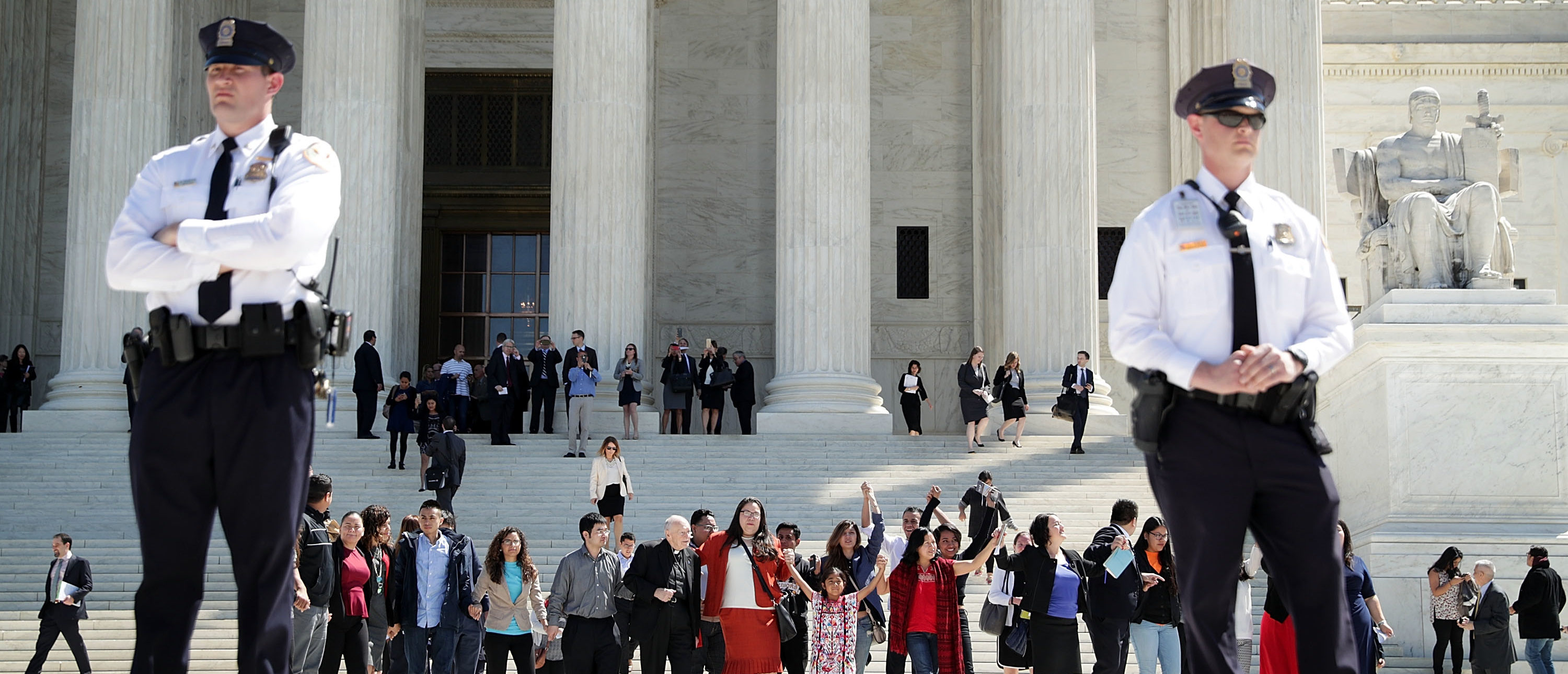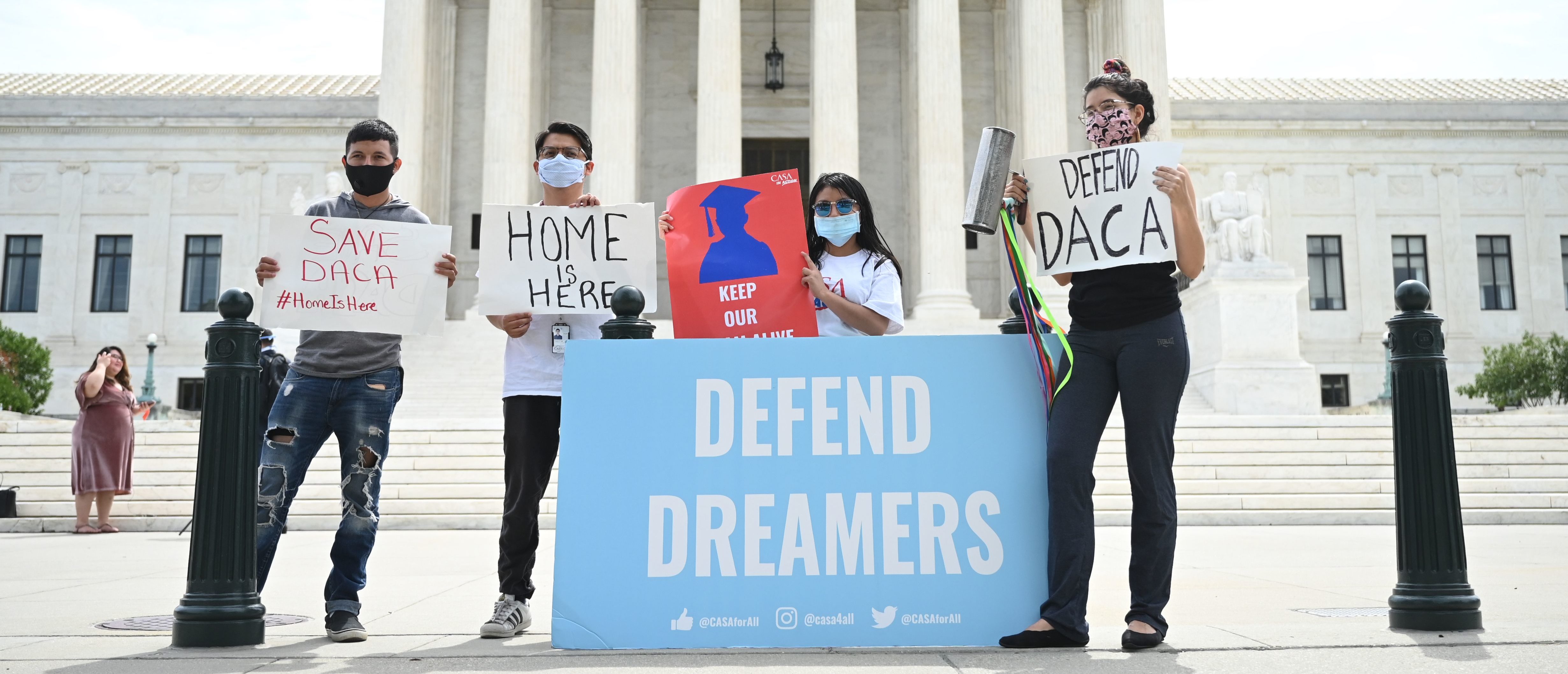The Supreme Court is set to resolve a legal dispute that will determine the future of the Deferred Action for Childhood Arrivals (DACA) program. An Obama-era program, DACA allows nearly 700,000 illegal immigrants to live and work in the United States.
The dispute is a combination of three different DACA cases, the most prominent being Department of Homeland Security v. University of California. The other two cases included are Trump v. NAACP and McAleenan v. Vidal.
DACA was rescinded in 2017 by then Attorney General Jeff Sessions, but a U.S. district court reinstated the program in 2018. The Supreme Court took up the case in June 2019 and began oral arguments that November.
The Supreme Court’s ruling, which is expected to be delivered sometime this week, would decide whether or not the Trump administration’s authorization to rescind DACA was legally adequate. (RELATED: Trump Says Some DACA Recipients Are ‘Very Tough, Hardened Criminals’)

Security guards stand outside the Supreme Court as immigration reform supporters gather (Alex Wong/Getty Images)
If DACA is left in place, it will only be a temporary measure. The Supreme Court is not ruling on the program’s constitutionality, but rather on a small administrative dispute over paperwork. Three lower courts previously ruled that the memos released by the Department of Homeland Security (DHS) provided an insufficient justification for rescinding DACA.
The U.S. District Court for D.C. ruled in April 2018 that the memos would be subject to judicial review under the Administrative Procedure Act. If the Supreme Court upholds rulings from the lower courts, DACA would be temporarily revived until a new justification is provided by the Trump administration.
Current and previous DACA recipients would also be able to renew their status during the process.
The Supreme Court may also side with the administration, ruling that the DHS memos followed the correct procedural steps for ending DACA. This would overturn the decisions made by the lower courts, and would allow the Trump administration to continue phasing out the program.
New applications would be rejected, and the nearly 700,000 recipients would gradually lose their status until DACA fully sunsets. Because deferred action lasts two years and would become non-renewable if the Supreme Court rules in favor of DHS, all current and previous DACA recipients would eventually be eligible for deportation under immigration law.
Nearly 6,000 people would lose their status every week. Around 210,000 recipients would lose their benefits and protections by January 2021, and by the end of the year that number would jump to around 580,000, according to projections from DHS.
A decision to knock down DACA would certainly mobilize pro-DACA and progressive groups, who have long defended the program. Immigration remains a contested issue among voters, and the fallout from DACA’s end could last. (RELATED: Dreamers To Supreme Court: Ending DACA Amid Coronavirus Pandemic Would Be ‘Catastrophic’)

Demonstrators stand outside the Supreme Court to defend DACA June 15, 2020. (Jim Watson/AFP via Getty Images)
Pro-DACA groups have also criticized the Supreme Court for taking up the case during the middle of the coronavirus pandemic, as roughly 27,000 DACA recipients work in the healthcare industry.
President Donald Trump met with Senate Republicans earlier this year to discuss the future of DACA recipients, and has previously incorporated DACA into negotiations with Congress on immigration reform.
Republican Texas Sen. John Cornyn said Wednesday that Congress would take action to protect DACA recipients if the Supreme Court knocked down the program, the Houston Chronicle reported.
While there are two possible outcomes in this judicial battle, none are expected to protect the Obama executive-era order in the long-term. If the Supreme Court sides with DHS, the recipients would lose their protections as the program sunsets.
Even if Congress passes an immigration reform package to protect DACA recipients, the program itself would soon cease to exist, replaced by a new policy voted on by Congress and signed by the president.
Because the case is a procedural dispute, it is unlikely that DACA, as it currently stands, will be allowed to continue in the long-term.


